October 31, 2019

By Peter F. Stevens
BIR Staff
To say that Brian Kennedy has defied the odds is an understatement. The acclaimed Northern Irish singer and songwriter came of age in Belfast’s war-torn cityscape during The Troubles, and his gifted voice proved to be his ticket to international success.
The first international artist to record the world-famous anthem “You Raise Me Up,” which he performed at the funeral of soccer legend George Best, Kennedy has toured with such heavyweights as Van Morrison and captivated audiences across the globe.
Everything changed for him in 2016 when he was diagnosed with colon cancer. For the next two years, he endured round after round of chemotherapy and, in 2018, a nine-hour operation after which he needed two colostomy bags and additional chemo. All through the ordeal, he battled through it, moving, in his word, “onward.” Despite an initially dire prognosis, by June of this year he was given the near-miraculous news that he was cancer free.
In his darkest hours, he never forgot where he came from. Kennedy asserts that the resilience he has carried from Belfast’s once-violent neighborhoods has proven key to his battle with colon cancer over the past three-plus years. Now, he is back onstage and in the studio with a renewed sense of purpose and perspective—as well as a new EP, “Recovery” – all of which he will bring to audiences in Boston on Dec. 8 (2 p.m.) as a special guest at the Spirit of Christmas concert at John Hancock Hall, and in New York at Carnegie Hall the next day, Dec. 9. The former event will also feature, among others, the New York Tenors, accompanied by The Big Apple Ensemble; the latter will mark the realization of a lifelong dream for the Belfast-born singer.
Recently, Kennedy, who is also a successful author, television star (The Voice-Ireland coach) and radio host (Clare FM Saturdays, “Life, Love and Happiness,” spoke with the BIR from Dublin about his journey from The Troubles to his recovery from cancer and triumphant return to the stage.
Q. So many people who came of age during “The Troubles” in Belfast ended up embittered, and rightfully so. How did you manage to come through it in just the opposite way?
A. Honestly, I think it has to do with the music yet again…I was so obsessed with that, it distracted from the awful world around us. Punk came along at a good time when the rules were that there were no rules. I just missed punk, but was glad of the glamor of the new romantic movement and the hopefulness of Boy George as he implored, “Do you really wanna hurt me?”...
Q. In the darkest moments of battling your illness, what helped keep you going and fighting?
A. I always knew there was someone in the world who was much worse off than I was, whether it was someone trapped in Syria or even in a bad marriage. I kept visualizing myself well and onstage again. I managed to focus on that even though friends were dying around me. I just knew I had so much more living to do yet.
Q. Since you've returned to the studio and stage, how, if at all, do you feel your musical perspective has changed or adapted?
A. I always hoped I had a deep sense of empathy, but I think that has deepened now that it’s almost exactly a year since my life-changing surgery. I feel incredibly lucky to still be here and doing such interesting work again, in and out of the studio.
Q. For others battling their own illnesses or demons, might you have some advice?
A. It’s hard to give advice to anyone suffering, and I wouldn't have been a great listener, especially when I was at my lowest, but you have to trust your instincts, and sometimes admit defeat and allow someone to help. Letting go of control is very weird at first, but it’s very freeing in the end.
Q. How would you describe your outlook and perception musically and personally before and now after your illness?
A. Honestly, they're not that much different. If anything, the journey with cancer really reminded me of whom and what to prioritize in my life, and I only made a few wee changes. I’m an eternal optimist and I'm so lucky to have the friends that I do have,
Q. What are you hoping to convey to your fans during your upcoming performances in the states?
A. I would like to think that I’ll win over some brand-new fans, and the message is very clear to me that with the right outlook in life you can triumph over any adversity.
Q. On "Recovery," what themes and thoughts and personal insights are most important to you as you share the songs with your audience?
A. Well, recovery, for a start. I wanted to take the little selfies to try to document visually every stage of my stay in Hospital. “Child of War” was a very important song to write, given my childhood and the very real war in Belfast at that time, and then the very real difficulty with cancer as a man in my 50s and having to learn to walk again and start at the beginning. I wanted this collection of songs to really sum up this period of truth, justice, and love…like the chorus of the song proclaims.
Brian Kennedy’s work is available online – Apple Music, Spotify, and Amazon.
Tickets (all seats reserved) for the Spirit of Christmas concert at John Hancock Hall on Dec. 8 are priced at $99, $59, and $49. Call 508-285-9700. Online purchases can be made at cooneyshows.simpletix.com.

